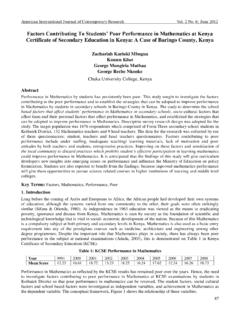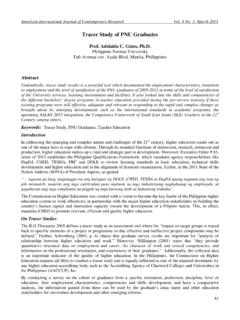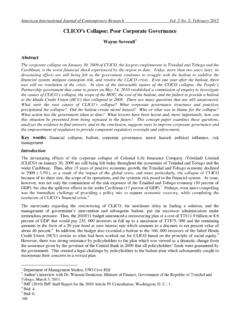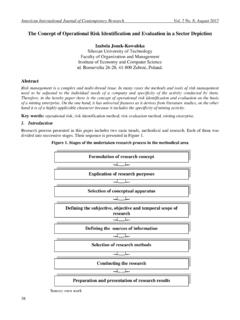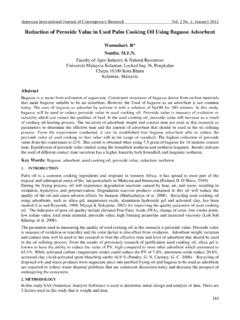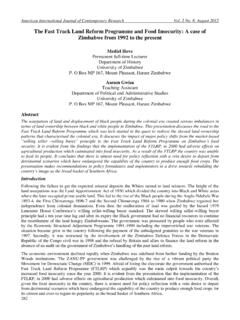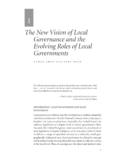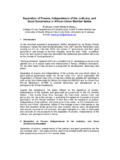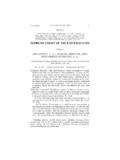Transcription of Influence of the Federal Character Principle on …
1 American International Journal of Contemporary Research Vol. 4, No. 6; June 2014 121 Influence of the Federal Character Principle on national integration in Nigeria Philips O. Okolo Department of Political Science Faculty of the Social Sciences Niger Delta University Wilberforce Island P. O Box 797, Yenagoa Bayelsa State, Nigeria West Africa E-mail: or Abstract This paper examined the Influence of the Federal Character Principle (FCP) on national integration (NI) in Nigeria from pre-colonial, through the colonial and the post-colonial eras to the present day application of the FCP in the country. It states that, FCP was designed to fundamentally address the striking features of Nigeria politics of intense struggles for power among the different ethnic groups in the country between the elites from the North and other Southern counterparts and the various segments, but the practice of FCP in Nigeria so far raises curiosity and doubts.
2 This paper is therefore anchored on identifying issues in the application of FCP as well as options that would promote peaceful co-existence. Given the critical appraisal, the study finds that Ethnocentrism, Elitism, Mediocrity, Mutual suspicion amongst others accounts for some inhibiting factors of the FCP in Nigeria. The conclusion is that, NI is pivotal and absolutely necessary for the stability of the country. Thus, the paper argues that the FCP and Federal Character Commission (FCC) has not been able to address the obvious imbalances in various segments of the country s affairs. Hence, the paper advocates for the urgent need for the consultation of all sections in the implementation of the FCP policy in Nigeria.
3 Finally, the paper recommends that, the FCP clauses inscribed in the 1974 and 1999 constitutions as amended displays heinous attitude by elites and therefore should be expunged, and that efforts be made to thinker smart options for survival as a nation such as True Federalism , Patriotism, Honesty, and Fairness. Keyword: Federal Character Principle , national integration , Nation Building, Elites, Patriotism, Fairness, Livelihood, Struggles for Power 1. Background of the Study Federal Systems the world over are today increasingly seen as political arrangements that afford an opportunity for the myriad diversities within a political system to find legitimate expression. Elazar (1993) has rightly opined that the Federal Principle is intrinsically an expression of political diversity and accommodation without in any way undermining the basic commitment to the sovereignty of the nation.
4 Shastri, (2001:1). The very fact that Federalism rests upon the love for complexity Rougement, (1986:21); Shastri, (2001:1), is clearly and pivotally demonstrated by several studies which have focused on capacity of Federal Systems to successfully negotiate and manage political cleavages (as among others Ducachek, 1970; Morrison and Stevenson, 1972; Mehden, 1973; Hibbs, 1973; Diamond et, al. 1988; Kothari, 1988; Ekeh et, al 1989; Osaghae, 1991; Elazar, 1993; Horowitz, 1993; Watts, 1995; Yadav, 1996; Suberu, 1999; Shastri, 2001; Okolo, 2011; Adeosun, 2011; Cornelius and Esheya, 2013). The desirability and/or attractiveness of the Federalism project is intrinsically and directly linked to the very wide range of options that it offers Federalism is considered a question of degree Bother, (1998: 17); Shastri, (2001:1) especially in the context of the demands and requirements of a particular society.
5 Center for Promoting Ideas, USA 122 As I have noted elsewhere, from its genesis; Federalism did not begin as a concept that has to do with social or political organization: unlike other concepts, its birth was also not associated with reflective philosophers or that expounded by pedagogic political scientists Okolo, (2011: 1). However, as a form of political organization, Federalism permits both the compulsions of collective action in terms of shared values, and the need to retain the Regional Space to be meaningfully reconciled. In contemporary political systems, the strength and usefulness of the Federal design or experiment can be analysed and explained in terms of its capacity to meet two very crucial and vital variables and/or demands, first the need to construct an efficient / effective, dynamic and modern state and second, the desire to celebrate or enjoy diversity.
6 As elucidated earlier, the Federal project or experiment needs to be seen not merely as a formal set of institutions and processes, but could also be viewed as a strategy for political management. The implication therefore, is that, there is no ideal Federal model for nations to adopt and emulate. Thus, the Federal arrangement that a given nation or any political system adopts must be tailored or designed to suit its own distinct social economic, cultural and political realities, and not necessarily fit an ideal Federal design. It is in this context, that this seminar paper examines the evolution of the Federal Character Principle (FCP) in Nigeria, and its Influence on national integration (NI), thereby contributing to the debate on comparative Federal studies.
7 The rest part of this paper is structured into five parts. The first part deals with the statement of the problem. This is followed closely with the evolution of the concept of Federal Character Principle (FCP). The next section appraised the Federal Character Principle . The fourth section enumerated and discussed the issues surrounding the application of the FCP and NI. The last section concludes the paper with recommendations. 2. Statement of the Problem Nigeria is a multi-ethnic state, like many sub- sharan African States. The Northern part of the country is populated by the Hausa s, the Fulani s, Kanuri s, Igala s, Igbira s and many others. The Southern part of the country on the other hand is occupied by the Yoruba s, the Ibo s or Igbo, the Ijaws, the Edos, the Ibibio s, the Urhobo s and many other small ethnic groupings.
8 Now each of these groups not only inhabits a particular territory or area but also has a distinct language indigenous to them. It was against this background that, when the colonialists came into the country, they met and saw that there was no common language, particularly between and amongst the major ethnic groups and groupings. Another truism about Nigeria is the fact that, she is also a multi religious state with a substantial population being adherents of Islam (Muslims) Christianity (Christians) and a host of indigenous religions. In spite of these glaring and obvious differences, the British government unified the various people under a common administration in 1914, one hundred years ago (century). This so called union has been described by a very prominent Nigerian Political Scientist as a forced brotherhood and sisterhood Ayoade, (1998:101) thus, the country has since been confronted with the challenges of accommodating diversities, fostering inclusiveness and promoting national unity amongst its diverse ethnic groups that make up the Nigeria s nation state.
9 A fundamental and striking feature of Nigeria politics is the intense elites struggle for power among the different ethnic groups in the country. These struggles have been between the elites from the North and other Southern counterpart. Often, the reasons advanced behind the tension are the fears in the North that the more educated South would pre-dominate state institutions as well as the concerns in the southern part of the country that the contentious more populated North would have an edge in the electoral contests. The zero sum nature of political competition amongst the elites precipitated a very bloody civil war between 1967 and 1970 Adeosun, (2011: 2); Okolo, (2010 pp. 1 61). For Orji (2008:125) the soul - searching that followed the civil war reflected in the quest for elite s consensus on how Nigeria should be governed to ensure political stability and fairness in the distribution of resources among the various ethnic groups that inhabit, or makes up the country.
10 See Adeosun, 2011:2. It is against this background that this paper examines the Influence of Federal Character Principle (FCP) in Nigeria and how it has occasioned national integration (NI) or otherwise. 3. The Evolution of the Concept of Federal Character Principle In the Nigeria political scene one may like to understand the phrase Federal Character Principle (FCP) as applied to Nigerians. American International Journal of Contemporary Research Vol. 4, No. 6; June 2014 123 It means the numbers of its constituent members, their inter relationship, the allocation of powers and functions amongst them and such other tangible matters which are usually carefully spelt out in legal terms in a constitution and on which designated courts of the land can pronounce binding opinions.
